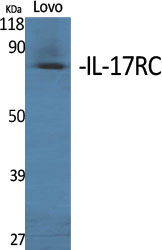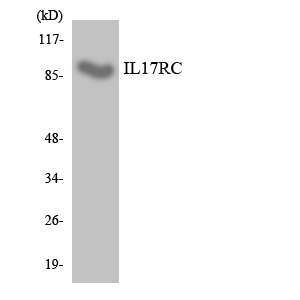IL-17RC Polyclonal Antibody
- Catalog No.:YT2317
- Applications:WB;ELISA
- Reactivity:Human;Rat;Mouse;
- Target:
- IL-17RC
- Fields:
- >>Cytokine-cytokine receptor interaction;>>IL-17 signaling pathway;>>Alcoholic liver disease
- Gene Name:
- IL17RC
- Protein Name:
- Interleukin-17 receptor C
- Human Gene Id:
- 84818
- Human Swiss Prot No:
- Q8NAC3
- Mouse Swiss Prot No:
- Q8K4C2
- Immunogen:
- The antiserum was produced against synthesized peptide derived from human IL17RC. AA range:721-770
- Specificity:
- IL-17RC Polyclonal Antibody detects endogenous levels of IL-17RC protein.
- Formulation:
- Liquid in PBS containing 50% glycerol, 0.5% BSA and 0.02% sodium azide.
- Source:
- Polyclonal, Rabbit,IgG
- Dilution:
- WB 1:500 - 1:2000. ELISA: 1:20000. Not yet tested in other applications.
- Purification:
- The antibody was affinity-purified from rabbit antiserum by affinity-chromatography using epitope-specific immunogen.
- Concentration:
- 1 mg/ml
- Storage Stability:
- -15°C to -25°C/1 year(Do not lower than -25°C)
- Other Name:
- IL17RC;Interleukin-17 receptor C;IL-17 receptor C;IL-17RC;Interleukin-17 receptor homolog;IL17Rhom;Interleukin-17 receptor-like protein;IL-17RL;ZcytoR14
- Observed Band(KD):
- 70kD
- Background:
- This gene encodes a single-pass type I membrane protein that shares similarity with the interleukin-17 receptor (IL-17RA). Unlike IL-17RA, which is predominantly expressed in hemopoietic cells, and binds with high affinity to only IL-17A, this protein is expressed in nonhemopoietic tissues, and binds both IL-17A and IL-17F with similar affinities. The proinflammatory cytokines, IL-17A and IL-17F, have been implicated in the progression of inflammatory and autoimmune diseases. Multiple alternatively spliced transcript variants encoding different isoforms have been detected for this gene, and it has been proposed that soluble, secreted proteins lacking transmembrane and intracellular domains may function as extracellular antagonists to cytokine signaling. [provided by RefSeq, Feb 2011],
- Function:
- alternative products:Additional isoforms seem to exist,induction:By HGF and VEGF.,subcellular location:Soluble isoforms may be produced.,tissue specificity:Expressed in brain, cartilage, colon, heart, intestine, kidney, liver, lung, muscle, placenta, and prostate. Low expression in thymus and leukocytes. Expressed (at protein level) in prostate and prostate cancer, skeletal muscle, kidney and placenta.,
- Subcellular Location:
- Cell membrane ; Single-pass type I membrane protein . Soluble isoforms may be produced.
- Expression:
- Expressed in prostate, skeletal muscle, kidney and placenta (at protein level) (PubMed:11706037). Expressed in brain, cartilage, colon, heart, intestine, kidney, liver, lung, muscle, placenta, and prostate (PubMed:11706037). Also detected in thyroid, trachea and adrenal gland (PubMed:17911633). Low expression in thymus and leukocytes (PubMed:11706037).
- June 19-2018
- WESTERN IMMUNOBLOTTING PROTOCOL
- June 19-2018
- IMMUNOHISTOCHEMISTRY-PARAFFIN PROTOCOL
- June 19-2018
- IMMUNOFLUORESCENCE PROTOCOL
- September 08-2020
- FLOW-CYTOMEYRT-PROTOCOL
- May 20-2022
- Cell-Based ELISA│解您多样本WB检测之困扰
- July 13-2018
- CELL-BASED-ELISA-PROTOCOL-FOR-ACETYL-PROTEIN
- July 13-2018
- CELL-BASED-ELISA-PROTOCOL-FOR-PHOSPHO-PROTEIN
- July 13-2018
- Antibody-FAQs
- Products Images

- Western Blot analysis of various cells using IL-17RC Polyclonal Antibody
.jpg)
- Western Blot analysis of HuvEc cells using IL-17RC Polyclonal Antibody

- Western blot analysis of the lysates from RAW264.7cells using IL17RC antibody.



